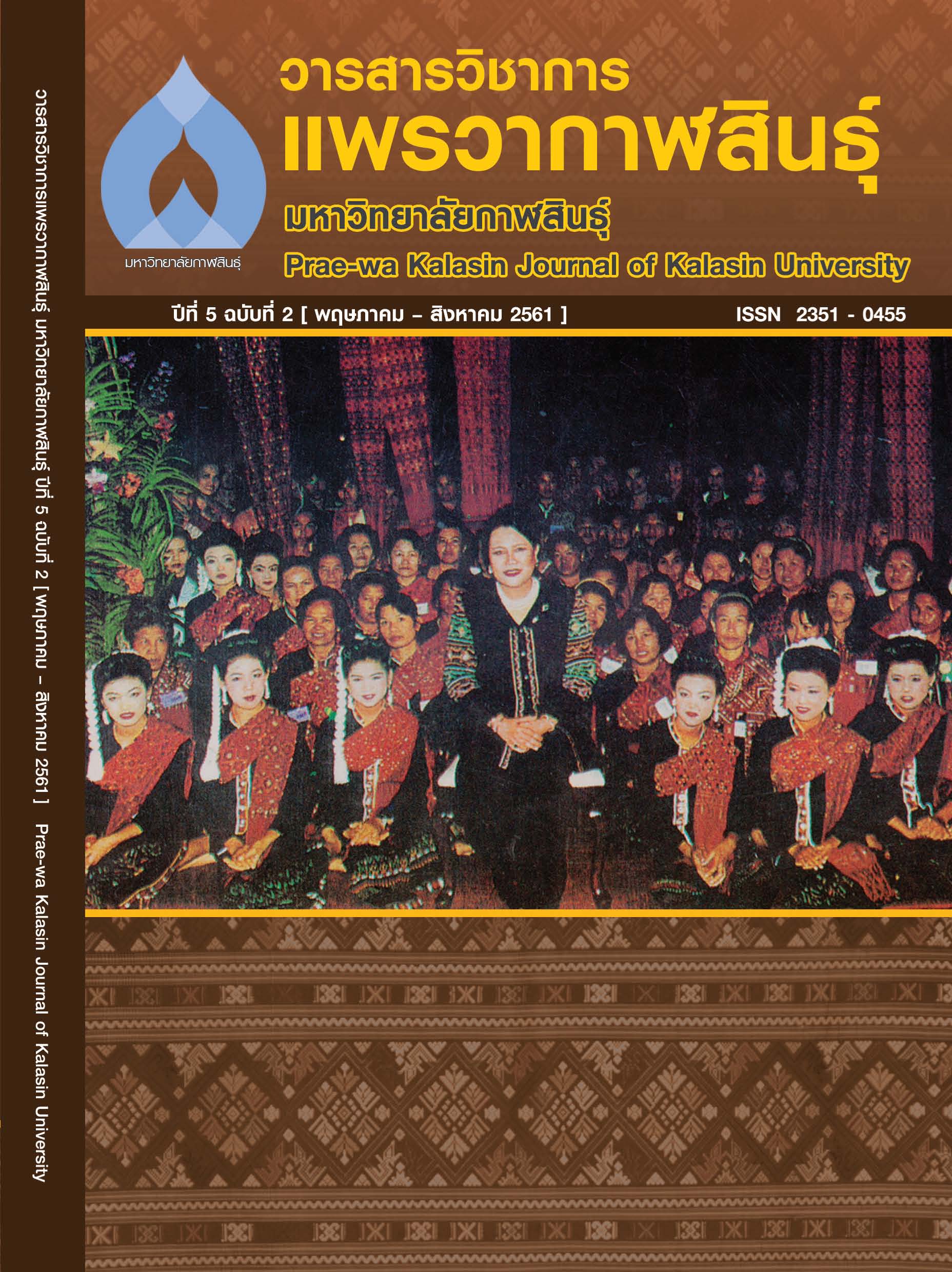Self-regulated Learning Using Task-based Learning with WebQuest
Main Article Content
Abstract
The purposes of this research were to 1) develop the instructional package by using task-based learning and WebQuest, 2) investigate the required efficiency of 75/75 of English instructional package, 3) compare pre-test and post-test English writing ability, and 4) explore the students’ self-regulated learning. The experimental group samples used in this study consisted of 32 Matthayomsusa 4 students, Mahasarakham University Demonstration School, obtained using the cluster random sampling technique. The instruments used in the study were; an instructional package, a pre-post English essay writing test, and a scale on self-regulated learning. The statistics used for analyzing the collected data were mean, standard deviation, percentage, and dependent sample t-test. The results of the study indicated that: 1) the developed instructional package consisted of 8 lesson plans (24 hours of learning activities), 2) The developed instructional package had an efficiency of 76.35/77.77, 3) The students showed gains in English writing ability from before learning at the .01 level of significance, and 4) The students showed gains in self-regulated learning as a whole at the high level.
Article Details
References
จิราพร ประพัศรานนท์. (2557). การพัฒนาการเรียนภาษาอังกฤษเพื่อการสื่อสารโดยใช้กิจกรรมการเรียนรู้แบบเน้นงานปฏิบัติของนักเรียนชั้นประถมศึกษาปีที่ 3. วารสารการศึกษาและพัฒนาสังคม.
ปนิตา นิรมน. (2547). การพัฒนาโมเดลความสัมพันธ์เชิงสาเหตุการกำกับตนเองในการเรียนของนักเรียนชั้น มัธยมศึกษาปีที่ 3. วารสารวิจัยและวัดผลการศึกษา.
สุมิตรา อังวัฒนกุล. (2540). วิธีสอนภาษาอังกฤษ. (พิมพ์ครั้งที่ 4). กรุงเทพฯ: สำนักพิมพ์จุฬาลงกรณ์มหาวิทยาลัย.
แสงระวี ดอนแก้วบัว. (2558). ภาษาศาสตร์สำหรับครูสอนภาษาอังกฤษ. กรุงเทพฯ: สำนักพิมพ์จุฬาลงกรณ์ มหาวิทยาลัย.
สำนักทดสอบทางการศึกษาแห่งชาติ. (2559). สรุปผลการทดสอบการศึกษาแห่งชาติขั้นพื้นฐาน (O-Net)ชั้นมัธยมศึกษาปีที่6 ปีการศึกษา2558 จาก http://www.onetresult.niets.or.th/ AnnouncementWeb/PDF SummaryONETM6_2558.pdf
อภัทรลิน พลยิ่ง และสมโภชน์ พนาวาส. (2558). การใช้ภาระงานในการสอนด้านคำศัพท์ภาษาอังกฤษสำหรับ นักเรียนชั้นประถมศึกษาปีที่5. จาก http://journal.nmc.ac.th/th/admin/Journal/2558 Vol2No1_41.pdf
Alshumaimeri, Yousif. & Bamanger, Ebrahim. (2013). The Effects of WebQuest Writing Instruction on The Writing Performance of Saudi Male EFL Learners. Social and Behavioral Sciences.
Al Fadda, Hind et al. (2011). A Preliminary Study of the Effect of WebQuests on Writing Performance of Saudi Female EFL Elementary School Students. The JALTCALL.
Al-Mahrooqi, Rahma et al. (2015). Methodologies for Effective Writing Instruction in EFL and ESL Classrooms. USA: IGI Global.
Andrade, Maureen Snow. & Evans, Norman W. (2013). Principles and Practices for Response in Second Language Writing Developing Self-Regulated Learners. UK: Taylor and Francis.
Awada, Ghada & Ghaith, Ghazi. (2014). Impact of Using the WebQuest Technological Model on English as a Foreign Language (EFL) Writing Achievement and Apprehension. Arab World English Journal.
Berns, Magie. (2010). Concise Encyclopedia of Applied Linguistics. Oxford: Elsevier Science.
Bitter, Gary & Legacy, Jane. (2007). Using Technology in the Classroom. Singapore: Pearson.
Campbell, Cherry. (1998). Teaching Second-Language Writing: Interacting With Text. Boston: Heinle & Heinle.
Chuo, Isabel Tun-Whei. (2007). The Effects of the WebQuest Writing Instruction Program on EFL Learners' Writing Performance, Writing Apprehension, and Perception. TESL-EJ.
Conbreet, Sandra & Carter, Ronald. (2002). The Language of Speech and Writing. New York: Tayler & Francis
e-Library.
Craig, Jennifer Lynn. (2013). Integrating Writing Strategies in EFL/ESL University Contexts. New York: Routledge.
Dembo, H. Myron. & Seli, Helena. (2008). Motivation and Learning Strategies for College Success: Self-Management Approach. New York: Routledge.
Dodge, Bernie. (1997). Some Thoughts About WebQuests. From http://webquest.sdsu.edu/about_webquests.html
Fernández, Victoria. (2007). WebQuest: How do Students Approach Their Integration in the Foreign Language Classroom?. The Journal of Teaching English with Technology.
Hsiao, Hsien-Sheng et al. (2012). Implementing a Self-Regulated WebQuest Learing System for Chinese Elementary Schools. Australasian Journal of Educational Technology.
Hyland, Ken. (2003). Second Language Writing. New York: Cambridge University Press.
Kellogg, T. Ronald et al. (2013). Working Memory in Written Composition: An Evaluation of the 1996 Model. Journal of Writing Research.
Larsen-Freeman, Diane. & Anderson, Marti. (2011). Techniques and Principles in Language Teaching. UK: Oxford University Press.
McDonough, Kim & Dao, Phung. (2017). The Effect of Task Role on Vietnamese EFL Learners' Collaboration in Mixed Proficiency Dyads. System.
Negari, Mousapour. (2011). A Study on Strategy Instruction and EFL learners Writing Skill. International Journal of English Linguistics.
Rod, Ellis. (2003). Task-based Language Learning and Teaching. Oxford: Oxford University Press.
Sox, Amanda & Eliane Rubinstein-Ávila. (2009). WebQuest for English Language Learners: Essential Elements for Design. Journal of Adolescent & Adult Literacy.
Wankel, Charles & Blessinger, Patrick. (2012). Increasing Student Engagement and Retention Using Online Learning Activities. UK: Emerald.
Willis, Jane. (1996). A Framework for Task-Based Learning. UK: Longman.
Zimmerman, Barry J. (2000). Self-Efficacy: An Essential Motive to Learn. Contemporary Educational Psychologist.
Zimmerman, Barry J. & Schunk, Dale H. (1989). Self-regulated Learning and Academic Achievement: Theory, Research, and Practice. New York: Springer-Verlag.
Zumbrunn, Sharon. (2011). Encouraging Self-Regulated Learning in the Classroom: A Review of the Literature. USA: Virginia Commonwealth University.

